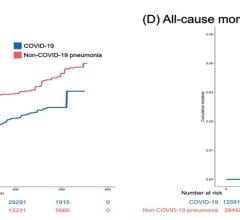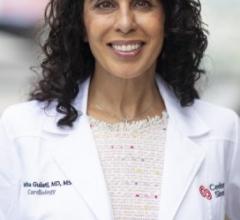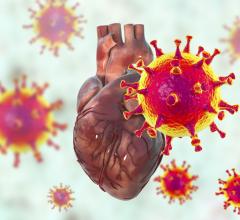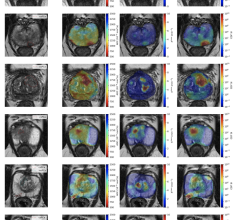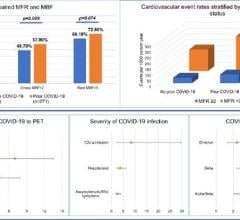
American Society of Nuclear Cardiology (ASNC) President Randy Thompson, M.D., getting his COVID-19 vaccine when the vaccines first became available last December. Nearly a year later, some healthcare workers are still holding out and are refusing to get the vaccine, which prompted CMS today to now require COVID vaccinations for all healthcare workers at facilities that accept Medicare and Medicaid patients.
November 4, 2021 — The Centers for Medicare and Medicaid Services (CMS) today issued an emergency regulation now requiring COVID-19 vaccinations for all eligible staff at healthcare facilities that participate in the Medicare and Medicaid programs.
CMS has set a deadline of Dec. 5 for healthcare facilities to create a COVID vaccination requirement policy and a deadline of Jan. 4, 2022 for all staff at these facilities to be fully vaccinated.
CMS said the new regulation is designed to protect those fighting the virus on the front lines, while also delivering assurances to individuals and their families that they will be protected when seeking care. The new rule is part of the The Biden-Harris Administration's efforts to contain the virus and alleviate the public's fear of going to healthcare facilities due to the virus. The policy is also an effort to address issues around healthcare workers having a much higher exposure risk to the virus and the strain on the healthcare system when they become infected and take off work during peaks in new cases.
"Unvaccinated staff pose both a direct and indirect threat to the very patients that they serve. Vaccines are a crucial scientific tool in preserving and restoring efficient operations across the nation’s healthcare system while protecting individuals," CMS said in its press release announcing the new regulations. "This new requirement presents an opportunity to continue driving down COVID-19 infections, stabilize the nation’s health care system, and ensure safety for anyone seeking care."
CMS said these requirements will apply to approximately 76,000 providers and cover over 17 million healthcare workers across the country. The regulation will create a consistent standard within Medicare and Medicaid while giving patients assurance of the vaccination status of those delivering care.
The prevalence of COVID-19, in particular the Delta variant, within healthcare settings increases the risk of unvaccinated staff contracting the virus and transmitting the virus to patients, CMS said in its announcement of the new regulations today. When healthcare staff cannot work because of illness or exposure to COVID-19, CMS said the strain on the healthcare system becomes more severe and further limits patient access to safe and essential care.
“Ensuring patient safety and protection from COVID-19 has been the focus of our efforts in combating the pandemic and the constantly evolving challenges we’re seeing,” said CMS Administrator Chiquita Brooks-LaSure. “Today’s action addresses the risk of unvaccinated healthcare staff to patient safety and provides stability and uniformity across the nation’s healthcare system to strengthen the health of people and the providers who care for them.”
Healthcare Facilities Need to Establish a COVID Vaccination Policy by December 5
Facilities covered by this regulation must establish a policy ensuring all eligible staff have received the first dose of a two-dose COVID-19 vaccine or a one-dose COVID-19 vaccine prior to providing any care, treatment, or other services by Dec. 5, 2021.
All Healthcare Facility Staff Need to be Vaccinated by January 4
All eligible staff must have received the necessary shots to be fully vaccinated by January 4, 2022. This means either two doses of Pfizer or Moderna, or one dose of Johnson & Johnson (Janssen) vaccines. The regulation also provides for exemptions based on recognized medical conditions or religious beliefs, observances or practices. Facilities must develop a similar process or plan for permitting exemptions in alignment with federal law.
CMS accelerated outreach and assistance efforts encouraging individuals working in health care to get vaccinated following the Administration’s announcement that it would expand the requirement for staff vaccination beyond nursing homes to include additional providers and suppliers. Since the Administration’s announcement, nursing home staff vaccination rates have increased by approximately nine percentage points – from 62 to 71 percent. This increase is encouraging, and this regulation will help to ensure even greater improvement in the vaccination rate among healthcare workers.
Enforcement of the CMS COVID Vaccination Regulation
CMS will ensure compliance with these requirements through established survey and enforcement processes. If a provider or supplier does not meet the requirements, it will be cited by a surveyor as being non-compliant and have an opportunity to return to compliance before additional actions occur. CMS’s goal is to bring healthcare providers into compliance. However, the agency said it will not hesitate to use its full enforcement authority to protect the health and safety of patients.
Which Healthcare Facilities Need to Comply With the CMS COVID Vaccination Regulation?
The new CMS regulation requiring COVID vaccinations for all staff includes nearly all types of healthcare facilities that receive Medicare and Medicaid payments for service. The requirements apply to:
• Hospitals
• Ambulatory Surgical Centers
• Hospices
• Programs of All-Inclusive Care for the Elderly
• Long Term Care facilities
• Psychiatric Residential Treatment Facilities
• Intermediate Care Facilities for Individuals with Intellectual Disabilities
• Home Health Agencies
• Comprehensive Outpatient Rehabilitation Facilities
• Critical Access Hospitals
• Clinics, which includes rehabilitation agencies and public health agencies as providers of outpatient physical therapy and speech-language pathology services
• Community mental health centers
• Home infusion therapy suppliers
• Rural health clinics and federally qualified health centers
• End-stage renal disease facilities
Read the full CMS regulation requiring COVID vaccinations
Medical Societies Have Endorsed Requiring All Healthcare Workers Get Vaccinated
In late July, a coalition of 10 U.S.-based cardiovascular societies issued a statement in support of all healthcare systems requiring COVID-19 vaccines for healthcare and long-term care employees. The medical societies decided to take a stand after controversy arose after some health systems began requiring all employees to be vaccinated earlier this year.
This started with several of the larger healthcare systems around the country. and the most notable was the U.S. Department of Veterans Affairs (VA). The VA become the first major federal agency to pass such a vaccine mandate this past summer. The VA made the decision based on this past summer's wave of new Delta variant COVID cases, and the vast majority of hospitalizations were driven by unvaccinated people.
“The cardiovascular community supports and encourages healthcare systems to require COVID-19 vaccinations for healthcare and long-term care employees. The data is clear that the COVID-19 vaccine’s benefits far outweigh any risks and that it is our best tool to end this pandemic, but many, including many healthcare workers, have made the choice to not get vaccinated," read the joint statement sent out by the American College of Cardiology (ACC) and other major cardiology societies in the U.S., including the American College of Cardiology (ACC), American Society of Echocardiography (ASE), Heart Rhythm Society (HRS), American Society of Nuclear Cardiology (ASNC, Society for Cardiovascular Angiography and Interventions (SCAI), Society for Cardiovascular Magnetic Resonance (SCMR), Society of Cardiovascular Computed Tomography (SCCT), Society of Thoracic Surgeons (STS), Association of Black Cardiologists (ABC), and the Heart Failure Society of America (HFSA).
"Healthcare workers have been at the forefront of the COVID-19 pandemic, sacrificing their own health, well-being and, in many cases, their lives, to care for patients around the world suffering from coronavirus. But the fight is not over," the statement continues. "With the recent surge of new cases fueled by variants and the unvaccinated, patients are again overwhelming hospitals, and many are dying. The cardiovascular community believes that we cannot allow unvaccinated healthcare workers to put the vulnerable, the immunocompromised and unvaccinated children at risk within a healthcare setting."
OSHA Also Issues Vaccination Requirement
The U.S. Department of Labor's Occupational Safety and Health Administration (OSHA) Nov. 4, also announced a new emergency temporary standard for mandatory COVID vaccinations. This rule applies to more than 84 million workers and is aimed at preventing the spread of the coronavirus on the job.
Under this standard, covered employers must develop, implement and enforce a mandatory COVID-19 vaccination policy, unless they adopt a policy requiring employees to choose to either be vaccinated or undergo regular COVID-19 testing and wear a face covering at work.
The U.S. Department of Labor announcement states many of the people killed and infected by this virus over the past year and a half were workers whose primary exposures occurred at their jobs. OSHA estimates this rule will save thousands of lives and prevent more than 250,000 hospitalizations due to workplace exposure to COVID-19.
The emergency temporary standard covers employers with 100 or more employees – firm or company-wide – and provides options for compliance. The rule also requires employers to provide paid time to workers to get vaccinated and to allow for paid leave to recover from any side effects.
Additional COVID Vaccine Content:
Questions About COVID-19 Vaccination
Study finds benefits of COVID-19 vaccination outweigh risks of rare cases of myocarditis
Viruses are the most common cause of myocarditis in children, experts offer guidance
Related COVID-19 Vaccine Content:
Cardiovascular Societies Support COVID-19 Vaccines for all Healthcare Workers
Pfizer-BioNTech COVID-19 Vaccine Gets Full Approval from FDA
COVID-19 Vaccine Can Cause False Positive Cancer Diagnosis
Help Spread Awareness of Potential COVID-19 Vaccine Imaging Side-effects
VIDEO: COVID Vaccine May Cause Enlarged Lymph Nodes on Mammograms — Interview with Constance "Connie" Lehman, M.D.
COVID-19 Vaccination Axillary Adenopathy Detected During Breast Imaging
PHOTO GALLERY: How COVID-19 Appears on Medical Imaging
American Heart Association Supports COVID Vaccine Boosters Suggested by the CDC
FDA Adds Myocarditis Warning to COVID mRNA Vaccine Clinician Fact Sheets
Cardiac MRI of Myocarditis After COVID-19 Vaccination in Adolescents
Nodal and Deltoid Radiotracer Uptake on Post-COVID-19 Vaccination PET
VIDEO: COVID Vaccine Adenopathy Can Last Up to 10 Weeks — Interview with Yael Eshet, M.D.
Small Number of Patients Have Myocarditis-like Illness After COVID-19 Vaccination
Overview of Myocarditis Cases Caused by the COVID-19 Vaccine
Find more related clinical content Coronavirus (COVID-19)

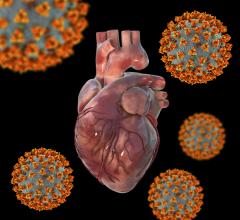
 March 20, 2024
March 20, 2024 

